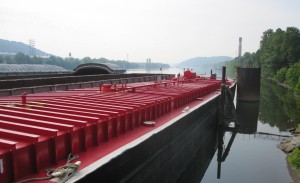Coast Guard would require testing before allowing fracking wastewater on barges
-
Katie Colaneri

Courtesy of James Guttman
Natural gas drillers want to use double hull enclosed tank barges like this one to ship off fracking wastewater for disposal.
Demand from natural gas drillers has prompted the U.S. Coast Guard to propose allowing fracking wastewater to be transported on barges. But under the proposal, the Coast Guard won’t allow it unless they know what’s in it.
Many operators recycle wastewater and store it on site, while much of it gets shipped on trucks and rail cars to Ohio where it’s disposed of in deep injection wells. Moving wastewater on barges would be a more efficient alternative.
The Coast Guard wants to require shippers to test the fluid they’re carrying to make sure it doesn’t contain hazardous materials it doesn’t normally allow to travel on the nation’s waterways.
“In this case, the cargo is not a well-characterized product as most cargoes are, so we will be requiring on-going monitoring of the shipments,” Dr. Cynthia Znati with the Coast Guard’s Hazardous Materials Division said in an e-mail.
The chemical composition of wastewater, also known as “flowback,” can vary depending on the recipe a driller uses to frack a well and even where that well is drilled. It contains a high level of salts, as well as naturally-occurring heavy metals and some radioactive material.
Barge owners would be required to have each load of wastewater analyzed at a state-accredited lab and make the reports available to the Coast Guard for two years.
But that requirement could get complicated for barge owners like Peter Stephaich, CEO of Campbell Transportation in Pittsburgh. One barge could hold about 100 truckloads of wastewater from different drilling sites.
“One [bad] apple would spoil the bunch,” Stephaich said. “And it’s not our water. We would be stuck with the water and it would be very difficult for us to go back and find out whose water that was and undo that process.”
James Guttman, president of Belle Vernon-based Grandview Barge Line, thinks it should be tested by operators at the drilling site.
“But to test every truck and barge that comes through is a logistical delay that would be expensive,” Guttman said.
Oil and gas industry trade groups are calling for an extension to the public comment period which ends Friday at midnight. David Spigelmyer, the new president of the Marcellus Shale Coalition, said the industry needs more time to study the implications of the Coast Guard’s proposal.
When asked if he supported the testing requirement, Spigelmyer said the “industry does do thorough investigative analysis on a lot of the transportation loads that come onto area roadways.”
Fracking wastewater is exempt from the Resource Conservation and Recovery Act (RCRA), which establishes federal standards for the disposal of hazardous waste. As long as the wastewater is on the drill site, or in transit, it is not considered hazardous.
















